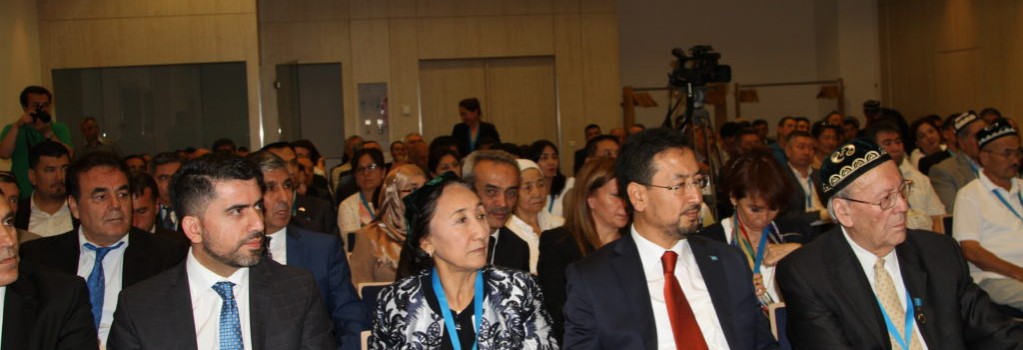Uighurs from China’s Xinjiang province accused Beijing of stepping up repression in the majority-Muslim region and vowed to end the Chinese “occupation” when they met near Paris this week. But not everybody present was convinced that the World Uighur Congress (WUC) is equipped to lead the Uighur minority.
Some 150 Chinese Uighurs met at the fifth WUC near Paris on 11-13 July.
Currently some 20 million Uighurs live in the western Chinese Xinjiang region.
They are tightly controlled by Beijing, which sees the area as a source of separatism, potential terrorism and general unrest.
The fifth WUC meeting started on Monday, lasting for three days, the current chairperson is exiled former businesswoman Rabyia Kadeer.
The meeting was held in a hotel near Charles de Gaulle Airport, after being moved away from its original venue at the French Senate in the centre of the French capital.
But the distance does not affect the spirit of activism.
“We are looking at our nation’s independence and full freedom,” says Ilshat Hassan Kokbore, a WUC vice-president. “We did have already two independent modern republics, the first one was founded in 1933, on 12 November, the second in 1944, on 12 November as well.
“This is our dream and our forefathers already created the foundation for us, and we need just to revitalise it and make it happen again.”
But this is not very likely to happen under the Chinese communist government of Xi Jinping.
In an effort to strengthen their position, exiled Uighurs try to link up with other separatist groups, such as the Tibetans and the Inner Mongolians, but also with Chinese dissidents, all people Beijing sees as “enemies of the state”.
There have been some unsuccessful attempts at dialogue with the Chinese state. And the situation deteriorated after the 9-11 attacks by Islamists on the US.
“The Chinese utilised the 9-11 terrorist attack on the World Trade Towers as an excuse to put more pressure on the Uighurs and also try to convince the international community to put pressure on the Uighur independence movement,” Kokbore says. “This created some difficulties.”
In total 21 Uighurs were detained in the US’s Guantanamo Bay detention centre on suspicion of taking part in terrorist activities. They were later released. They now live in exile in remote places such as the Pacific island of Palau.
“We are very grateful to the US government and the Western countries,” says Kokbore.
“They differentiate between our movement and terrorism. Because of our Muslim background, sometimes people blindly believe some prejudice, saying that Islam promotes violence.
“But Uighur people are different. Yes we are Muslim but we are very peaceful.”
Maybe outside China, people see the difference between what Kokbore calls the “Uighur issue” and terrorism but the Chinese state has toughened its stance.
“Uighurs’ daily life is also threatened by the Chinese government,” says Dolkun Isa, the WUC general secretary. “So is private life. Police can just knock the door and ask why a relative is visiting you. And tell him or her to register. This is a private issue!
“You can’t even grow a beard!”
And during the last Ramadan, police were harassing people who abstained from taking food at daytime, the activists say.
“That’s why sometimes people get feelings of revenge, because they don’t have any opportunity to enjoy their freedoms. They don’t have any chance. That’s why sometimes they turn to violence.”
There was animated discussion at the meeting.
But there was also speculation that there might be no contest for the leadership if sitting president, Rabyia Kadeer, decided to stand again.
“This reveals the weakness of the WUC,” says Enver Tohti Bughda, a Uighur surgeon living in exile in London and a fierce critic of the congress. In spite of his criticism he was invited to come, but he lingered in the corridors without listening to the discussions going on inside.
“I joined the WUC and at the beginning I was really excited. But the same excitement faded away when the first one, second one, the third one and produced no change. They were always talking the same language, there was no improvement, there’s no new agenda.”
He accuses WUC leaders of being reluctant to adopt democracy.
“They are coming from that communist system they have never met democracy,” he comments. “Democracy can be implanted if the mind is ready. This is not the case. Our mind is still living in the 18th century.”
If it fails to change, the WUC will remain a talking shop, rather than an effective lobby group, Bughda claims.
Source: rfi.fr
Uighur Culture and history Uighur Tours human rights Silk Road Uighur Uighur Tours uighur people

Leave a Reply